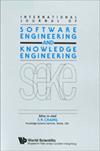基于ISO/IEC 25010的混合源软件质量评价层次模型
IF 0.6
4区 计算机科学
Q4 COMPUTER SCIENCE, ARTIFICIAL INTELLIGENCE
International Journal of Software Engineering and Knowledge Engineering
Pub Date : 2022-12-14
DOI:10.1142/s021819402250070x
引用次数: 0
摘要
随着混合源软件的出现,现有的质量模型无法较好地评估混合源软件的社区质量和自治可控性。为了填补这一空白,本文提出了一种用于混合源软件质量评估的层次模型。在该模型中,提出了基于ISO/IEC 25010标准的混合源软件质量要求的新属性,并为这些新属性设计了一套度量标准。该模型通过度量所量化的质量属性来评估混合源软件的质量。将本文的质量模型应用于某混合源软件,并将模型结果与实际情况进行对比,验证了本文提出的社区强度和自治可控性两个质量属性能否有效地评价混合源软件的质量。实验结果表明,该模型对混合源软件的质量评价是有效的。该模型的一个重要特点是具有良好的灵活性,质量属性和度量的集合可以自由调整,为各种软件质量评估需求提供了一种灵活可行的方法。本文章由计算机程序翻译,如有差异,请以英文原文为准。
A Hierarchical Model for Quality Evaluation of Mixed Source Software Based on ISO/IEC 25010
With the emergence of mixed source software, the existing quality models are not able to better assess the community quality and autonomy controllability of mixed source software. To fill this gap, we propose a hierarchical model in this paper for quality assessment of mixed source software. In our model, the new attributes are proposed to meet the quality requirements of mixed source software based on the ISO/IEC 25010 standards, and a set of metrics are designed for the new attributes. The model evaluates the quality of mixed source software through quality attributes that have been quantified by the metrics. Applying our quality model to some mixed source software and comparing the model results with the actual situation, we verify whether our proposed two quality attributes, community intensity and autonomy controllability, can effectively assess the quality of mixed source software. The results of the experiments show that our model is indeed effective in assessing the quality of mixed source software. An important feature of our model is that the model has good flexibility, and the set of quality attributes and metrics can be adjusted freely, which provides a flexible and feasible way for various software quality assessment requirements.
求助全文
通过发布文献求助,成功后即可免费获取论文全文。
去求助
来源期刊
CiteScore
1.90
自引率
11.10%
发文量
71
审稿时长
16 months
期刊介绍:
The International Journal of Software Engineering and Knowledge Engineering is intended to serve as a forum for researchers, practitioners, and developers to exchange ideas and results for the advancement of software engineering and knowledge engineering. Three types of papers will be published:
Research papers reporting original research results
Technology trend surveys reviewing an area of research in software engineering and knowledge engineering
Survey articles surveying a broad area in software engineering and knowledge engineering
In addition, tool reviews (no more than three manuscript pages) and book reviews (no more than two manuscript pages) are also welcome.
A central theme of this journal is the interplay between software engineering and knowledge engineering: how knowledge engineering methods can be applied to software engineering, and vice versa. The journal publishes papers in the areas of software engineering methods and practices, object-oriented systems, rapid prototyping, software reuse, cleanroom software engineering, stepwise refinement/enhancement, formal methods of specification, ambiguity in software development, impact of CASE on software development life cycle, knowledge engineering methods and practices, logic programming, expert systems, knowledge-based systems, distributed knowledge-based systems, deductive database systems, knowledge representations, knowledge-based systems in language translation & processing, software and knowledge-ware maintenance, reverse engineering in software design, and applications in various domains of interest.

 求助内容:
求助内容: 应助结果提醒方式:
应助结果提醒方式:


